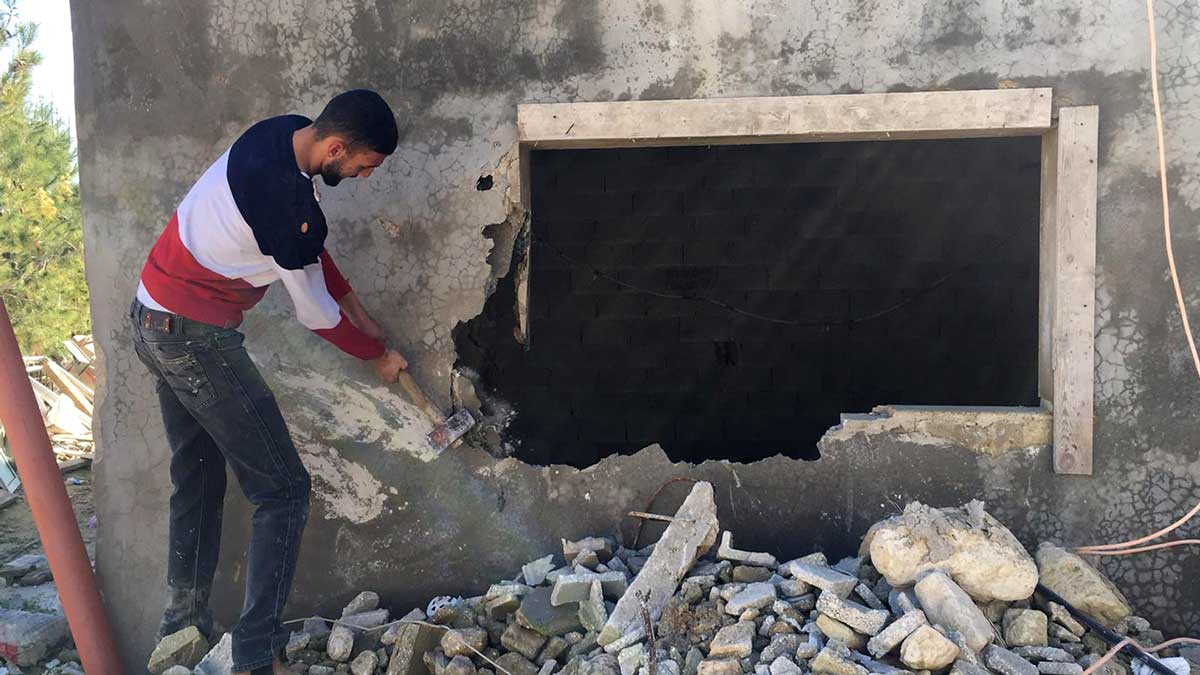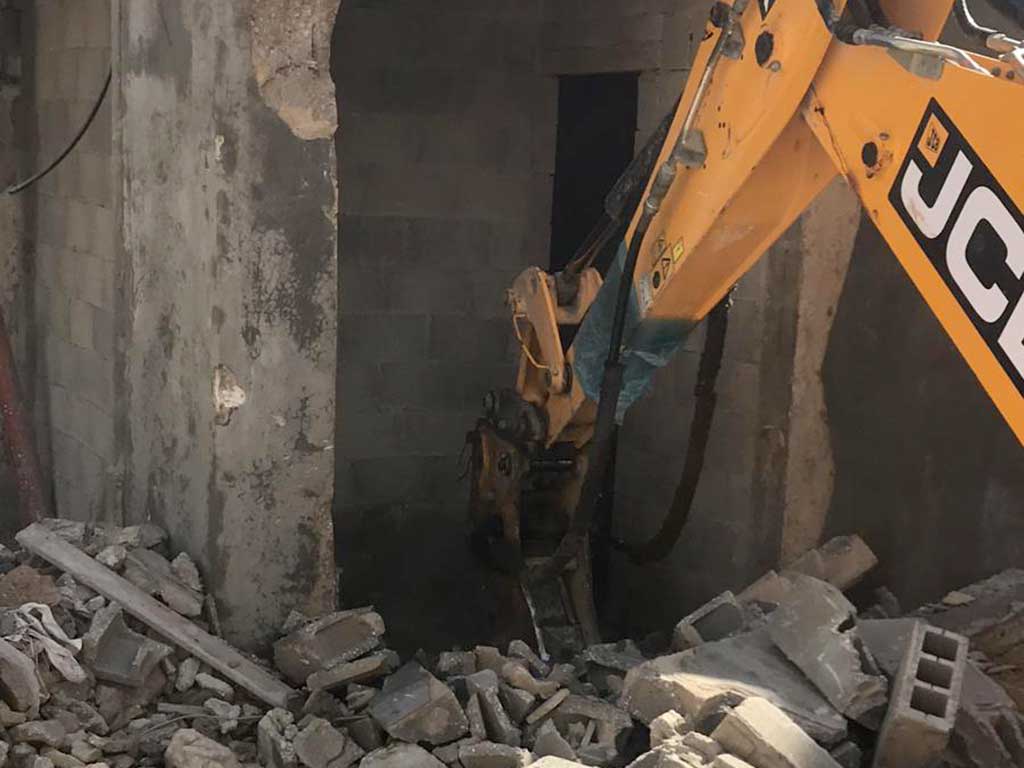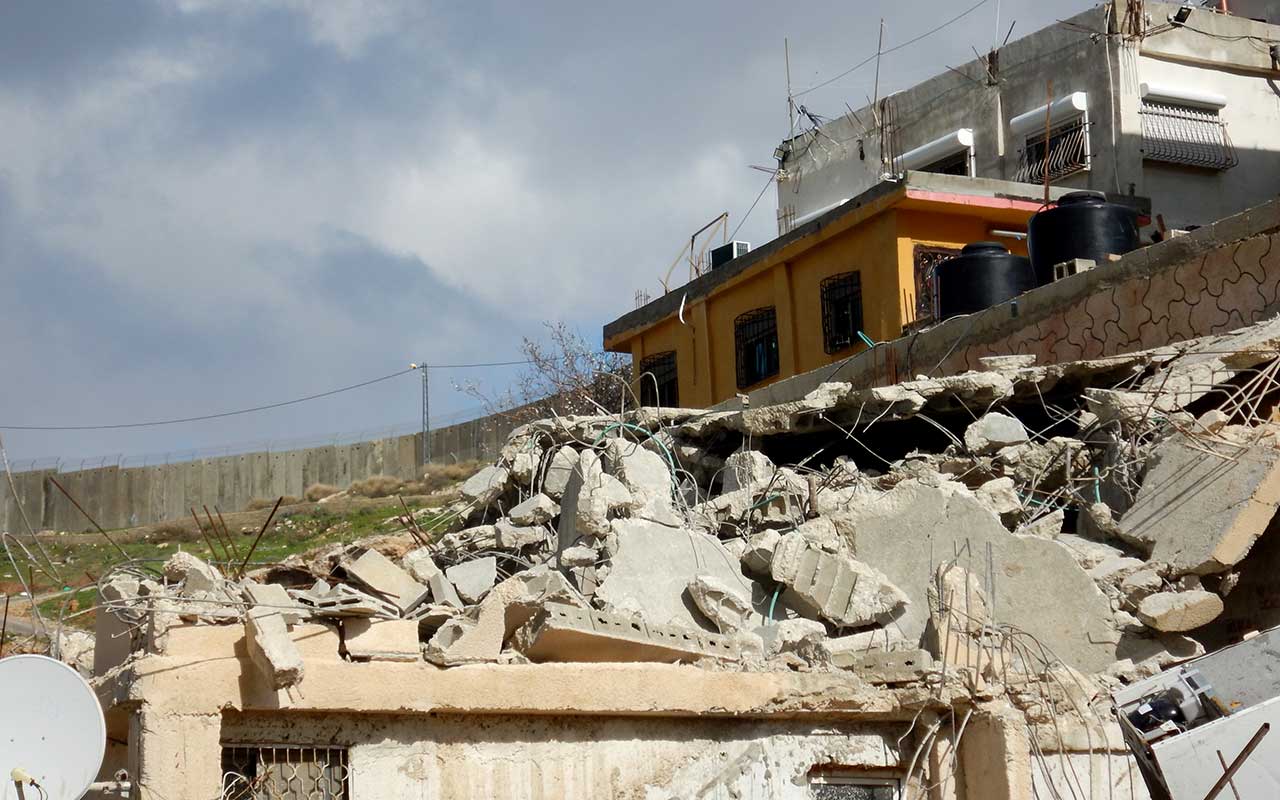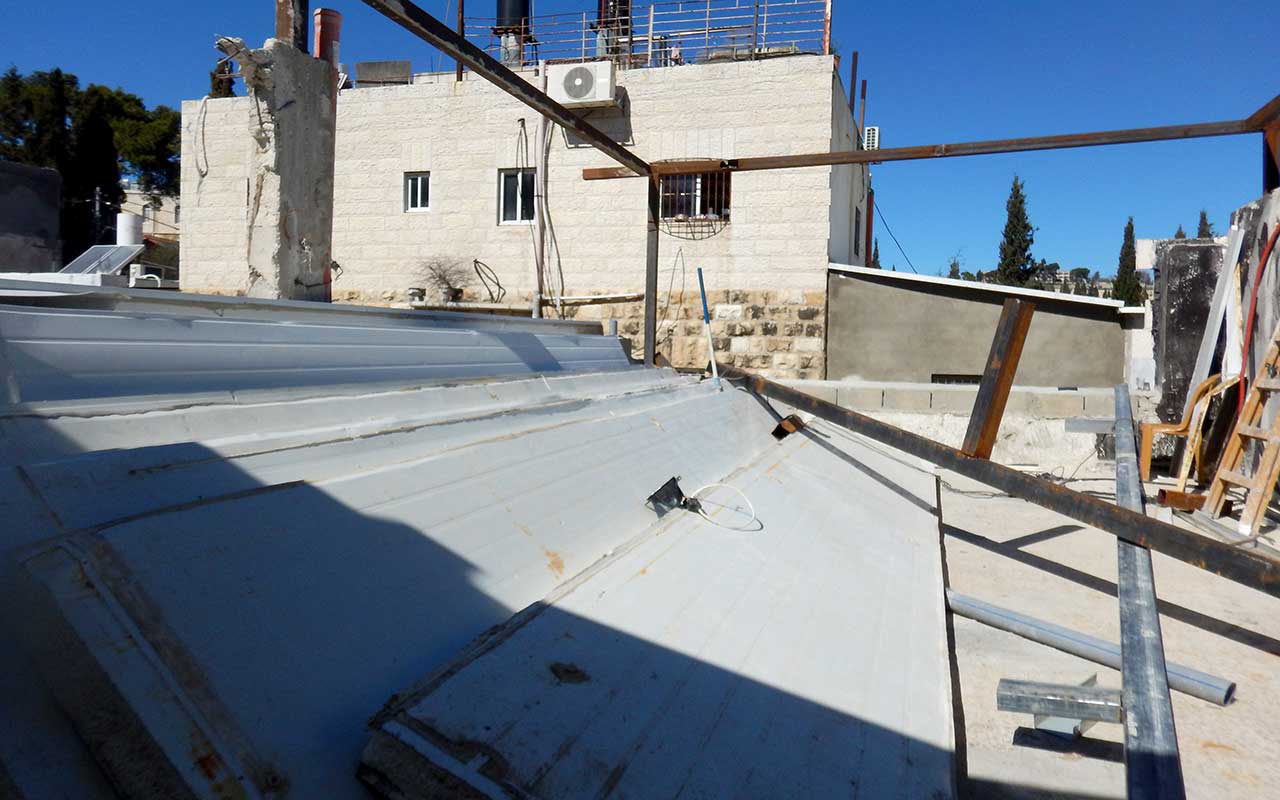“Self-destruction”: Palestinians in East Jerusalem Forced to Demolish Own Homes
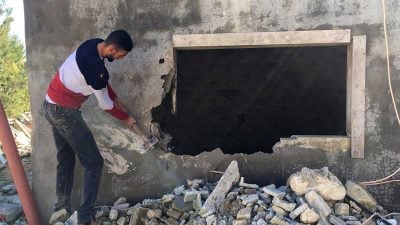
The year 2019 has seen a significant increase in the number of Palestinian residents of East Jerusalem who have had to demolish their own home, or part of it, after having built it without a permit. The residents elect this path in order to avoid paying the city thousands of dollars they would have been billed, had municipal authorities carried out the demolition. Fifteen residential homes were demolished by their owners in East Jerusalem from the beginning of the year until 31 March 2019, along with parts of two other homes, a store, and a car repair shop. The demolitions left 69 people, 40 of them minors, homeless.
The prevalence of construction without permits in East Jerusalem is a direct result of the policies pursued by all Israeli authorities, which have deliberately created an acute construction crisis for the city’s Palestinian population, while Jewish neighborhoods enjoy massive development and substantial funding. As part of this policy, Israel has expropriated more than a third of the land it annexed from the West Bank and has built 11 neighborhoods exclusively for Jews (under international law, the status of these neighborhoods is the same as the Israeli settlements throughout the West Bank).
When it comes to the Palestinian population, Israel has done the opposite – canceling all Jordanian master plans for the annexed area. It was not until the 1980s that the Jerusalem Municipality drew up master plans for all Palestinian neighborhoods in the eastern part of the city, plans that were chiefly designed to limit construction in these neighborhoods. The most striking feature of these plans was the designation of huge swathes of land as “open scenic areas” where development is forbidden. In 2014, these “scenic areas” made up about 30% of the land in Palestinian neighborhoods. Only some 15% of the land area in East Jerusalem (about 8.5% of Jerusalem’s municipal jurisdiction) is zoned for residential use by Palestinians under these plans, although they currently account for some 40% of the city’s population. Another measure Israel has employed to limit the amount of land available to Palestinians is declaring national parks where construction and urban development are almost entirely forbidden.
Given this reality, Palestinians have no choice but to build without permits. The Jerusalem Municipality estimates that 15,000 to 20,000 homes have been built without a permit in East Jerusalem in the past few years. Thousands of Palestinians in the city are living under constant threat to their homes and businesses; in many cases, the authorities follow through on this threat or force residents to demolish the structures themselves. From 2004 through March 2019, the Jerusalem Municipality demolished 830 residential units, and 120 more were demolished by their owners on the municipality’s orders. As a result, the municipality deliberately left 2,927 people homeless, 1,574 of them minors.
Israel does not see the residents of East Jerusalem as human beings with equal rights, but as people it strives to remove from their homes, as they are an obstacle to Judaizing the city. To that end, Israel employs various measures, all illegal: deliberately denying Palestinians construction for residential and other purposes, issuing demolition orders for structures built without a permit for lack of choice, and demolishing dozens of such structures a year. Israel has implemented this policy, designed to clear parts of the city of Palestinians, since occupying the West Bank and annexing East Jerusalem and the surrounding villages.
From January to March this year, B’Tselem field researcher ‘Amer ‘Aruri collected testimonies from Palestinian residents of East Jerusalem who had to demolish their own homes. Their stories, along with excerpts from their testimonies, follow:
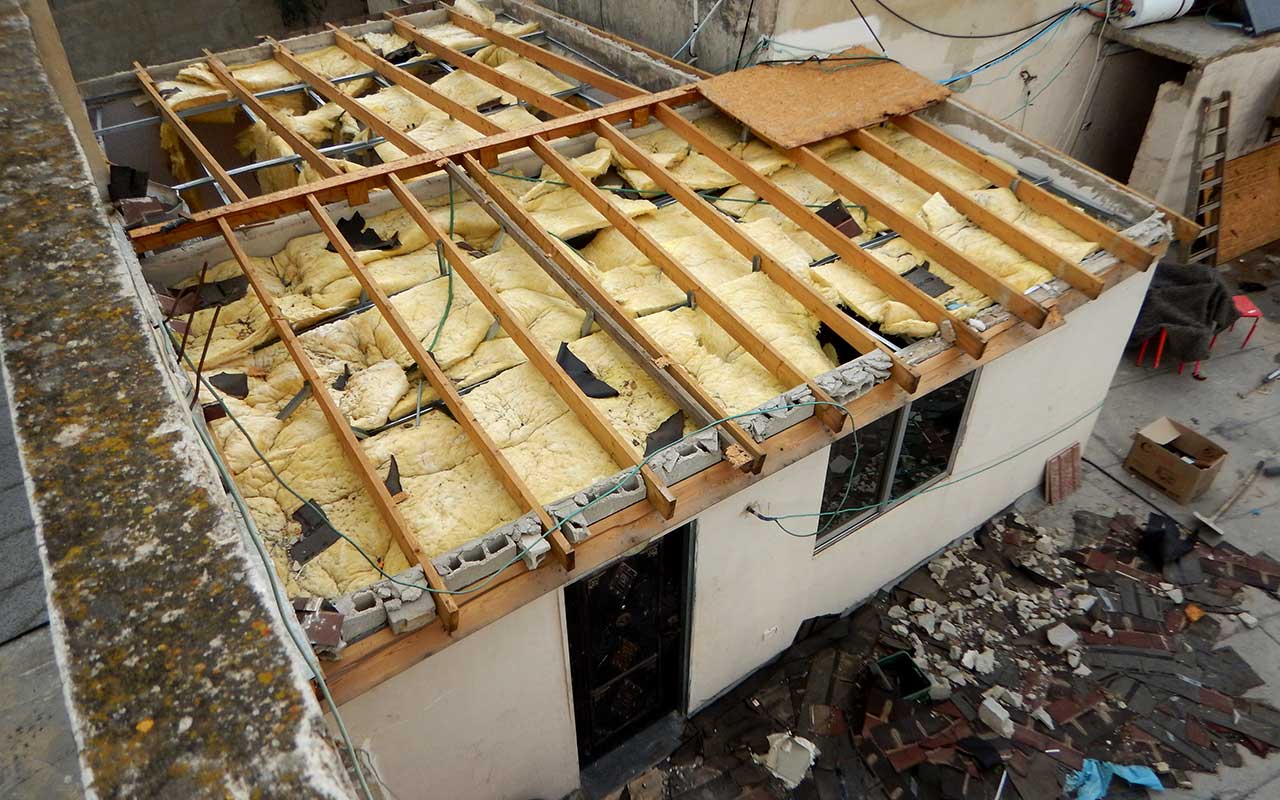
The apartment of Jamil Masalhah’s son, after he began the demolition. Photo by Amer Aruri, B’Tselem, 16 February 2019
The Masalmeh family, Silwan, 22 January 2019
The Masalmeh family has lived in the Wadi Hilweh neighborhood of Silwan since 1936. Jamil Masalmeh, 58, a husband and father of 13, married his wife in 1985 and has been living with her in his now deceased parents’ home ever since. In 1999, he added a porch to the house, but the municipality demolished it in 2005 on the grounds that it was built without a permit.
About five years ago, Masalmeh built a small unit on top of the house for his son, Adam, who got married soon after. Adam is now 28 and has a four-year-old son. Shortly after construction was completed, the family were issued a demolition order for the one-bedroom unit. They ignored it and never appealed to the authorities. On 15 January 2019, the family received another demolition order issued by the municipality, requiring them to demolish the unit themselves or pay the city for the cost of having it demolished – about 80,000 NIS (roughly 22,300 USD). On 22 January 2019, Jamil Masalmeh and his son set to work on the demolition, which they have not yet completed.
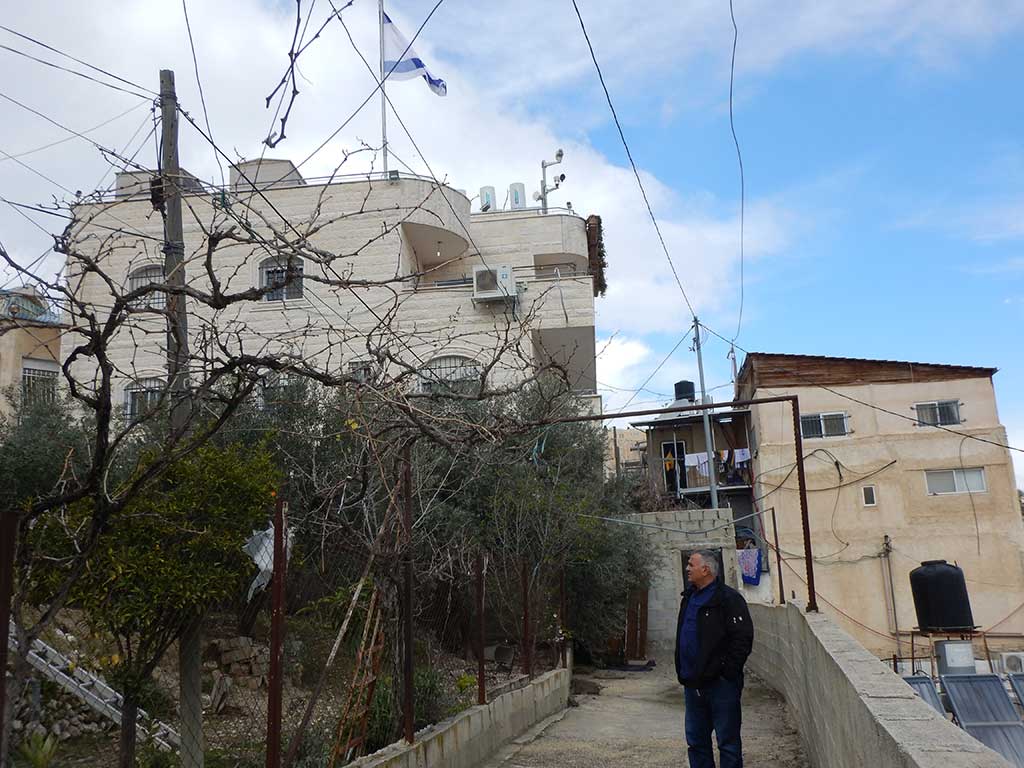
Settlement point next to the Masalhah family’s home. Photo by ‘Amer’ Aruri, B’Tselem, 16 February 2019
In a testimony he gave on 16 February 2019, Jamil Masalmeh (image below right) described being forced to demolish his son’s home:
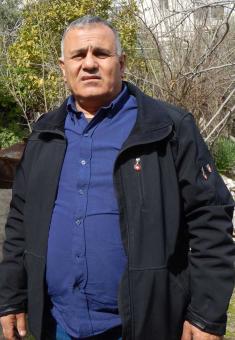
A few years ago, I built a small, 55-square-meter apartment with cinder blocks and wood, for my son Adam to live in after marriage. He’s now married and they had a boy, four years ago.
Of course, the municipality issued a demolition order for the unit. That was about four years ago. On 15 January 2019, we got a new order saying we had to demolish the unit or they would do it, in which case we’d have to pay for the cost, about 80,000 NIS (roughly 22,300 USD).
On 22 January 2019, I demolished the roof of the unit and Adam and his wife moved in with us. I haven’t finished the demolition yet. I have to take down the walls, too, before the municipality comes and does it itself. Otherwise I’ll have to pay them back for it. I’m waiting for my sons to have time to help me, so I don’t have to hire help and spend more money. I’ve suffered enough financial damage and mental harm from this affair.
Adam works in construction and doesn’t make a lot of money. He now lives with us in the house, but we only have three bedrooms, a bathroom, a kitchen and a living room. I gave the living room to him, his wife and their son, and the house has become small. There are currently ten of us living in the house, including three minors. I don’t know how long we can endure this and how long Adam and his family can handle living in one room and sharing the bathroom and the kitchen with us. I try to help him as much as I can, but there’s only so much anyone can take.
A relative of ‘Amer Abu Hussein’s helps demolish the rooms. Photo by the family
The Abu Hussein family, Jabal al-Mukabber, 2 February 2019:
In 1996, three brothers – Mahmoud, Naser and Najib Abu Hussein – built three houses on a plot of land they had inherited from their father. The military installed the a-Sawahrah a-Sharqiyah checkpoint about three kilometers away. That year, after construction was finished, the brothers received a demolition order issued by the Ministry of Interior. They contacted a lawyer, who was able to have the order stayed if they paid a 35,000 NIS fine (roughly 9,750 USD) for each home and launched proceedings to have the construction legalized. After a year-long legal battle, the case was handed over to the Jerusalem Municipality, which announced that the land was a designated green space and not zoned for construction. The three homes are still under threat of demolition.
Between 2016 and 2018, ‘Ammar (33) and Khaled (23) Abu Hussein, Mahmoud’s married sons, built two homes next to their parents’ house. When construction was finished, in 2018, they received demolition orders. The demolition was suspended due to legal action taken by the family, but in January 2019, the municipality issued a new demolition order for the two homes. On 2 February 2019, the sons had to demolish their own homes to avoid paying the city 80,000 NIS (roughly 22,300 USD) for the cost of the demolition.
In a testimony he gave on 14 February 2019, ‘Ammar Abu Hussein described how he and his brothers had to demolish their own homes:
In 2013, I got married and rented an apartment in Jabal al-Mukabber. I couldn’t build on top of my parents’ house because it’s under a demolition order and I didn’t want to take the risk. For six months, I paid 1,600 NIS (around 440 USD) a month in rent, and then I decided that it was better to build a small apartment on the roof of my parents’ home after all, which I did.
In 2016, my brother Khaled and I started building two units near our parents’ home. It took us two years to build them. We worked day and night and saved money, until we finished building in 2018.
It was very sad when that year, 2018, we got stop-work orders for both units from the Jerusalem Municipality. We contacted a lawyer who started a legal proceeding and managed to delay the demolition a few times, until, in January 2019, we got a new demolition order for our two units. They gave us a week to carry out the demolition ourselves. Since the threat of demolition was looming over us, I left the unit with my family and we moved into a rented place in Jabal al-Mukabber.
The bulldozer that the family rented demolishing the rooms. Photo by the family
On Monday, 2 February 2019, my brothers and I started demolishing the two apartments. We started with hand tools, and then switched to a bulldozer. The demolition cost us 12,000 NIS (roughly 3,350 USD). If the city had done it, we would have paid 80,000 NIS (roughly 22,300 USD), so we preferred to do it ourselves and save the money.
I know I wasted 150,000 NIS (almost 42,000 USD) taking a chance and building on land defined as a green zone. I’m still paying back the debt for building costs. But the problem isn’t with me, it’s the city’s policy, which offers no housing solutions for young couples. Why don’t they make master plans for Palestinian neighborhoods? Why do they force residents to build without permits?
The ruins of the Edkedek family’s home. Photo by Amer Aruri, B’Tselem, 16 Geb 2019
The Edkedek family, Ras al-‘Amud, 4 February 2019
The six members of the Edkedek family have been living in a rented home in the neighborhood of Ras al-‘Amud for about twenty years. In the 1990s, the family purchased building rights on the roof of another family’s home, also in Ras al-‘Amud, as well as a patch of land in that family’s yard. In December 2018, they built two apartments on the roof – one for the parents and children and the other for one son, Maamun, 27, who is about to get married. The family also built a storage room on the land it purchased in the yard. But before they were able to move into their new apartments, they received a demolition order from the municipality.
Maamun Edkedek hired laborers and began the demolition on 4 February 2019. He demolished the apartment intended for his parents first, and was planning to continue the work, but on 12 February 2019, city bulldozers came and demolished his intended apartment and the storage room.
In a testimony he gave on 16 February 2019, Maamun Edkedek, 27, an unmarried bakery employee, described what happened:
Image below: The apartments after Maamum Edkedek started demolishing them.
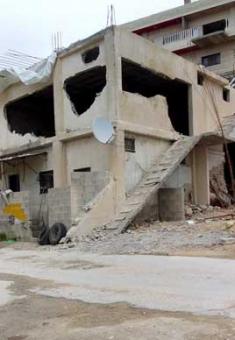
On 4 February 2019, I started demolishing the apartments with laborers. We used hand tools because the units were built on top of the neighbors’ house. We worked carefully to avoid damaging their house, and it took us about eight days just to demolish my parents’ apartment. Then, on 12 February 2019, city workers suddenly came with bulldozers and wanted to demolish my apartment and the storage room.
I told them I’d finished demolishing one apartment and that I was going to demolish the other one and the storage room. I explained that I was worried about using a bulldozer because the apartment is on the second floor and I didn’t want to cause damage to the neighbors on the first floor. They didn’t listen, and the city bulldozer started demolishing my apartment and the storage room.
All that’s left of the two apartments and the storage room is a pile of rubble. Each apartment was 80 square meters in size, and the storage room was about 60 square meters. We lost about 250,000 NIS (nearly 70,000 USD).
I’m getting married soon. Even though I’m not doing well emotionally, I won’t put the wedding off. I’ve started looking for a rental and it’s not easy, because apartments in Jerusalem are expensive. I’m a laborer and my income is limited. I’m worried that I’ll have to pay the city for the cost of the demolition, because I didn’t demolish everything in time.
The Subuh family, a-Shayah (Ras al-‘Amud), 5 February 2019
Mustafa Subuh, 55, a married father of five, purchased a 500-square-meter plot of land in the neighborhood of a-Shayah in the 1990s. He built a house on it covering 80 square meters. Soon after, he built a one-bedroom apartment on the plot. The apartment is home to his daughter Zeinab and her three children, aged 1 to 7. Her husband, a resident of Hebron, stays with them on the weekends. Over the years, Mustafa added two rooms and a bathroom to his own house.
Eight years ago, the family received their first demolition order, for Zeinab’s apartment and for the additions to the main house. Subuh hired a lawyer and submitted an application for a building permit along with plans, but the application was rejected. Several court hearings were held over the years regarding the demolition order. In the last hearing, the court issued a stay to the demolition until 13 March 2019. Nevertheless, in early February, a city official came to the family’s home and told them that if they did not demolish the house immediately themselves, the city would do it, and they would have to pay for the cost – 150,00 NIS (nearly 42,000 USD).
On 5 February 2019, Mustafa Subuh demolished the additions to his house and his daughter’s one-bedroom apartment. On 12 February, a city official came to make sure the demolition had been carried out. He gave Mustafa Subuh a new demolition order for the original house and the garage underneath it.
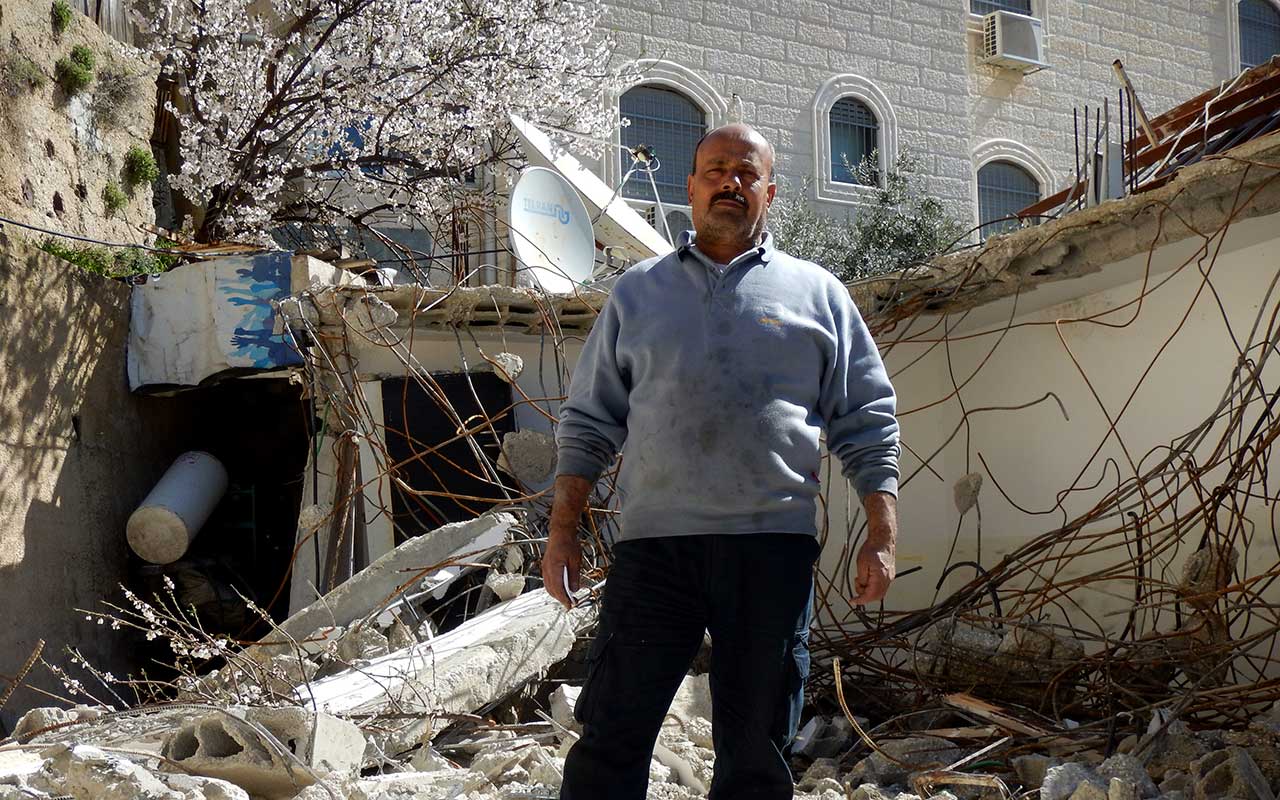
Mustafa Subuh standing on the ruins of the apartment he built for his daughter and her children. Photo by Amer Aruri, B’Tselem
In a testimony he gave on 13 February 2019, Mustafa Subuh talked about his family is now facing homelessness:
Seven years ago, my daughter Zeinab moved into a new apartment I built for her behind our house. Since then, she and her husband have had three children. Her husband, a resident of Hebron, visits on the weekends.
The first demolition order came eight years ago, citing construction without a permit. I hired a lawyer and he managed to delay the demolition. I also contacted an engineer who drew up a plan, in order to apply for a building permit. The plan was rejected.
My lawyer told me he’d managed to delay the demolition until 13 March 2019, but suddenly, at the beginning of February, a city official came and demanded that I demolish my own home. He said that otherwise, city bulldozers would come to demolish it and I’d have to pay the cost.
On 5 February 2019, I started demolishing the addition by hand. I demolished the other apartment, where my daughter Zeinab lives, with a bulldozer.
Now I’ve received another demolition order, and I’m going through the worst time of my life. I already demolished the addition and my daughter’s home on my own. Now, I have to demolish what’s left of my house, too. For eight years, I paid the city totaling 68,000 NIS (nearly 19,000 USD) worth of fines, and that’s on top of the money I paid the lawyer and the engineer, which amounted to tens of thousands of shekels. The demolition I did myself cost me 35,000 NIS (around 9,800 USD), because I had to rent a bulldozer and hire laborers. Where exactly does the city want us to live?
In a testimony she gave on 26 February 2019, Zeinab Subuh described having to watch her house be demolished:
One day, the difficult moment I’ve been dreading all these years arrived. My father told me we had no choice but to demolish the two apartments ourselves. I felt deep pain and despair. I looked at my children and felt very sad. I thought to myself, what does the future hold for them? I felt like a failure, because I wasn’t able to give my family shelter and security.
On the day of the demolition, I stood with the children watching it. My mother asked me to go into their house so the children wouldn’t see their home being demolished. But I stayed there, to watch and to mourn for the house. I hugged my children and wept.
Now we live with my parents in the old house. Rent in Jerusalem is at least 2,500 NIS (around 700 USD), which is what I make every month at my job delivering papers. My husband also has a low income. There are five people living in my parents’ home already. With us, that makes nine people in a very small house. It’s very crowded.
The concrete slabs remaining after Husam Al-Abasi had to demolish part of his home. Photo by Amer Aruri, B’Tselem, 9 march 2019
The al-‘Abasi family, Ras al-‘Amud, 2 March 2019
Husam al-‘Abasi, 31, is a married father of one and a construction worker. In 2013, before he got married, he began building an apartment for himself on top of his father’s home, but had to stop the construction for financial reasons. He got married in 2015, but because of the high cost of housing, he and his wife moved in with his parents.
In 2016, after Husam’s wife became pregnant, the couple decided to finish the apartment Husam had started on his parents’ rooftop and expand it. They moved into the new home that year. In January 2019, a city official came and told the family they would have to demolish the apartment, otherwise the city would demolish it and charge them the cost – 80,000 NIS (roughly 22,300 USD). On 2 March 2019, Husam demolished his home.
In 2016, after Husam’s wife became pregnant, the couple decided to finish the apartment Husam had started on his parents’ rooftop and expand it. They moved into the new home that year. In January 2019, a city official came and told the family they would have to demolish the apartment, otherwise the city would demolish it and charge them the cost – 80,000 NIS (roughly 22,300 USD). On 2 March 2019, Husam demolished his home.
In a testimony he gave on 9 March 2019, Husam al-‘Abasi described demolishing his own home:
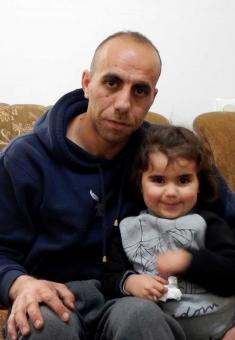
A month ago, an official from the Jerusalem Municipality came and gave me a demolition order for the addition I’d built. I’d built the original part of the house without a permit, too, because the city doesn’t give building permits in Palestinian neighborhoods.
On 2 March 2019, I had to demolish the house myself. If the city had done it, I’d have had to pay 80,000 NIS (roughly 22,300 USD) for the cost of the demolition.
I demolished my two-and-a-half-year-old daughter Rafif’s room, the living room, the bathroom and the balcony. Now I’m living in the old part of the house that I started building in 2013. It has one room, a kitchen and a bathroom.
I did lose about 150,000 NIS (almost 42,000 USD), but the emotional damage is worse. This experience will always haunt me, every time I look at the destroyed part of my home.
The Ja’abis (Shafita) family, Jabal al-Mukabber, 9 March 2019
Ilham and S’adeh, 35 and 38 respectively, have seven children between the ages of four and 18. For 18 years, they lived in various rental homes in East Jerusalem. In late 2017, Ilham’s brothers bought a plot of land in Jabal al-Mukabber so she and her family could build a home there.
The family moved into its new home in March 2018, but soon received an order from the Jerusalem Municipality to demolish it by 10 March 2019. A month before the deadline, a city official came to the house and told the family that if they did not demolish the house by the deadline, the city would carry out the demolition and they would have to pay the cost – 50,000 NIS (around 14,000 USD). On 9 March 2019, Ilham’s brothers came with a bulldozer and demolished the house.
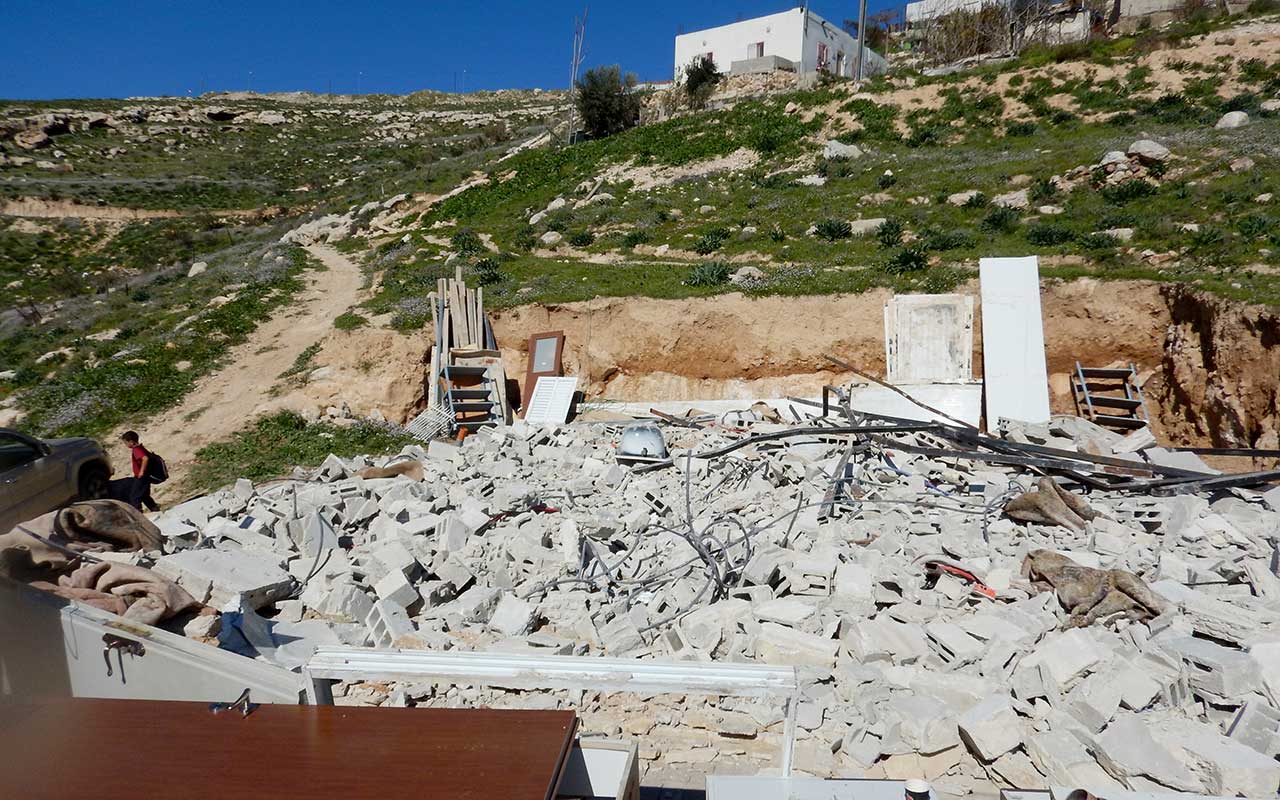
Husam AL-abasi with his daughter, rafif the ruin of the Ja’abis family’s home. Photo by Amer Aruri, B’Tselem, 9 March 2019
In a testimony she gave on 9 March 2019, Ilham Ja’abis described losing her home:
This morning, 9 March 2019, my brothers came with a bulldozer and demolished the house. In the meantime, my husband, children and I have moved into a 70-square-meter rented house. It’s a temporary solution until we find a bigger place.
We lost more than 200,000 NIS (around 5,600 USD), on top of what we paid for the land. The city says it’s a green space and we’re not allowed to build there. My children don’t understand why our house was demolished and we had to move. They keep insisting we go back to the old house.
The house was destroyed along with my dream – to live in a house that of I own, not a rental. We’re all in despair. Tonight will be my first night away from our home, in a rented house. It pains me and makes me sad.
*
Note to readers: please click the share buttons below. Forward this article to your email lists. Crosspost on your blog site, internet forums. etc.



